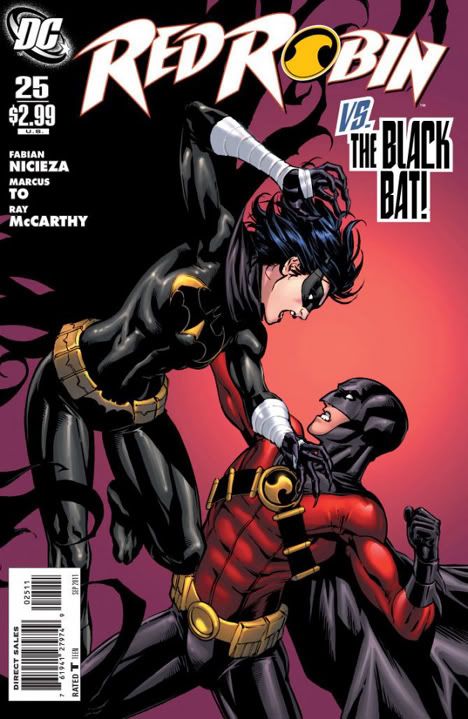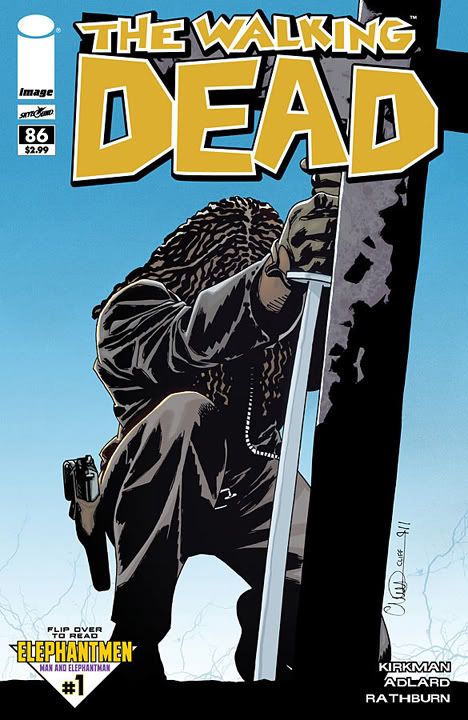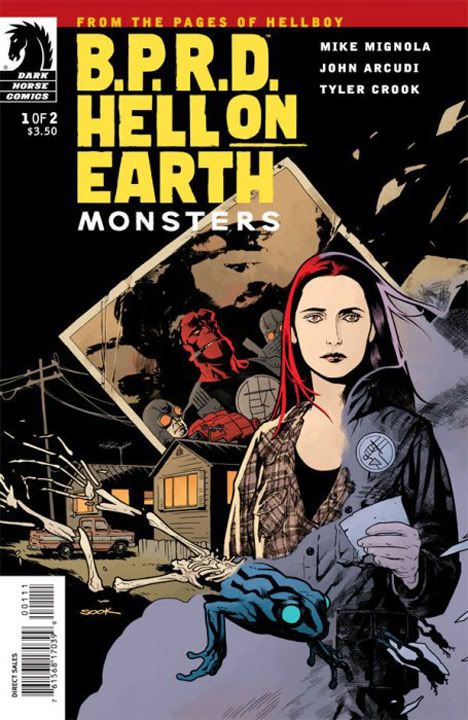 Red Robin #25
Red Robin #25
Publisher: DC Comics
Script: Fabian Nicieza
Pencils: Marcus To
Inks: Guy MajorJust the other day I complained in this blog about having aged out of DC's target demographic. Yet it seems for this single issue of
Red Robin, I'm the intended audience. Of course I don't really believe that for a second, but something happens early in this book I've often joked about.
As for the rest of the book-- have you ever wondered what a story about Dr. Watson's brother-in-law, with the Great Detective and the Hound of Baskervilles as ancillary elements would be like? Neither have I, but it would probably resemble
Red Robin #25. Nicieza and To fill the story with all character beats, action and explosions you could possibly want. Unfortunately, they face the nearly impossible task of generating interest in a generic lead. Peter Parker has girl trouble, Dick Grayson has a tragic past, Bruce Wayne is brilliant and rich. What is Tim Drake but a pastiche of these familiar elements? It doesn't help that a good deal of his narration at the start consists of telling us how awesome his co-star is, thereby reinforcing his own status as a non-entity.
And thanks to Nicieza and To, Cass is indeed awesome again. We know this because she rescues the hero then involves herself in a little comedic background business while Red Robin and an unseen supervillain (why are these guys so gregarious and yet cryptic about their plans?) engage each other in yawn-worthy plot-twaddle. It's funny, effective and much more entertaining than this tired stuff about assassinations, evil geniuses and nebulous and nefarious schemes. Cass has about six lines of dialogue and she could scarcely need more. I love how Nicieza takes away some of her English fluency without turning her into a caricature; she eschews subject nouns like Rorshach from
Watchmen without the psychosis. Mostly she expresses herself through physicality and in her wicked black outfit exudes enough charisma to outclass Red Robin in his own book. To's use of splashes and large panels in the action sequences ably display Cass's martial prowess. It's clean-lined and sharply rendered stuff and goes a long way towards soothing the savage Cass-fan that dwells inside.
Because it's so ensconced in the familiar-- one plot element is cribbed from the film
The Dark Knight-- the story lacks a sense of danger or urgency. Even the potentially life-altering situation Red Robin finds himself in at the get-go is treated mostly as a joke, dismissed as "'A Very Special Episode' kind of attacked" and "a fate not-quite-worse than death." The taciturn Cass even has a quip of her own for the occasion. This gives the proceedings a detached quality, a kind of ironic distance in which nothing much matters and nothing much is at stake. Later in the book, there's a one page sequence set in Hong Kong that leaves Red Robin battered and bruised. With its bizarre villain-- shades of the killer kid from
Kick Ass, the new Damian Wayne Robin and Cass herself-- it might have made for a more compelling or unusual adventure starring Cass with Red Robin as her guest-star.
Instead, it acts as an awkwardly inserted digression that reinforces my feeling DC has an ace creative team in place, but they're hamstrung because they're telling the wrong character's story; when Cass drops out of the narrative, so will I. If Nicieza suddenly finds himself assigned to a
Black Bat monthly DC and I might find ourselves meeting somewhere in the middle again.
 Walking Dead #86Publisher: Image Comics
Walking Dead #86Publisher: Image Comics
Script: Robert Kirkman
Art: Charlie AdlardAnd to contrast
Red Robin, here's a title which seems aimed at me almost every single issue. First and foremost, as an art geek I can't get enough of Charlie Adlard's gritty line work. I much prefer stylists-- impressionistic or expressionistic, loose and sketchy or clean-lined-- to the photorealists in comic book art. Photorealists excel at the mechanical aspects of their rendering, but they all too often detour through the uncanny valley-- Greg Land's gallery of lovingly detailed pro wrestlers and porn stars in the midst of orgasm come to mind. Adlard's pages ultimately have more believability because his characters aren't copied (or traced) from some easily-recognized celebrity. They inhabit a world of shadows where bodies have weight and presence. Adlard is also an exceptional storyteller who knows how to break up and pace a page, how to pose his figures and direct action sequences for clarity and maximum impact.
Kirkman's script for this issue is heavy on dialogue. Well, to be honest, most of his scripts for
The Walking Dead are, but #86 falls between the end of one major storyline and the beginning of another so there's quite a bit of back-and-forth between characters in the form of casually handled exposition. Rick, the deadly Michonne, crackshot Andrea and the rest have found a refuge within a walled suburb, and they've just come through a massed zombie attack that resulted in lots of gruesome deaths and a shocking injury to Carl, Rick's son, depicted by Adlard in a drawing so gruesome it actually disturbed me. I plan never to look at that page again!
Now the cast is just kind of hanging out, working through their emotions. Yes, there are some shambling zombies to dispatch, but it's in the service of showing us where the castmembers are now while they describe to each other where they've been. After so many issues, it's a good point for new readers to jump in and start reading. I can't help but feel Rick's new-found optimism is yet another sign the poor guy's lost his mind, though.
What's most fascinating about this particular issue isn't the story; it's the letter page.
The Walking Dead has the best letter page in the business, bar none. Editor Sina Grace and Kirkman himself mix it up with readers, cracking jokes and dealing with the largely endearing weirdness of the rabid fanbase this book has garnered over the years. Lately, they've run some blistering letters from readers upset about what Kirkman did to Carl.
I admire Kirkman's audacity and don't think he has anything to apologize for. This moment elevated the story's climax from a mere "third act action movie fight" to something approaching an operatic emotional intensity. It's also wickedly ironic considering some of the philosophies Kirkman has Rick espouse, a chillingly reductive viewpoint of us versus them, them being not the walking dead but the living families in his adopted community.
Essentially, Kirkman upset these readers by making his fiction do what fiction is supposed to do. A story should be about how and why the protagonist and, in a thickly populated book like this, the secondary characters transform from their initial state to something different. These changes are not always positive ones. A mainstream superhero comic is typically about how they stay the same for years and years and years until financially necessity dictates a new costume, a publicity stunt death-then-resurrection or a forced "new direction."
I'm not sure if Kirkman has an ending in mind for the overall narrative or if it's sustainable at great length without repeating itself-- already one of the book's weaknesses-- but he's not afraid to bring the hammer down on any particular individual character, all the while altering them in drastic ways because of story events. Rick has developed from competent good-guy lawman, husband and father to strong leader to crackpot capable of letting other people's children die to save his own... and now to someone with a potentially deranged evangelical fervor about making his new community work. Or maybe he's just become charged with positive energy and he's on his way to a happy ending. Whatever it is, Kirkman's written this organically rather than arbitrarily, and that's a major reason I've stuck with this book for 80-odd issues.
It is kind of odd, though, to find a line some readers aren't willing to cross in a story that features walking corpses who've devoured almost the entire population of North America, splattering gore, limbs chopped off, rapes and near-rapes and people constantly losing their loved ones. In fact, in the story they're upset about, Rick uses a hatchet to chop off a woman's hand-- just to add some charm, he's been sleeping with her and has convinced her to follow him in a desperate escape attempt that will surely doom any number of other people to horrific deaths-- and allows zombies to devour her and her child. That Rick has his reasons and that a zombie story demands sacrifice perhaps excuse him to a certain extent, but why stick at Kirkman's treatment of Carl in the midst of all these other tragedies?
Expanding on this idea, in order for the entire series to take place these zombies implicitly have to have eaten millions of children, including helpless little babies. Apparently readers can consign all those people to death in the interest of good clean fun. For audiences at large, aliens can disintegrate all of Los Angeles in a genocide of CGI fire in a movie or the entire world can fall apart killing billions because of some nonsensical prophecy in a stone calendar, but make sure there's a scene where a dog leaps to safety or else we're outraged. Outraged, I tells ya! Let Kirkman maim Carl, a character we've suffered along with for years, and it's "HOW DARE YOU, YOU INHUMAN MONSTER?!"
I've come to trust Kirkman, and find I can enjoy
The Walking Dead without worrying he'll eventually have to ret-con things to keep his story going for the sake of protecting trademarks and cashing in on merchandise sales ad infinitum. So when he wounds my heart with a development like this, I have to give him his due as an author of substance. Kirkman must be thrilled to know his work impacts people this way, even if a lot of them are calling him names and vowing never to read
The Walking Dead again. People care, and that's the mark of a great book.
 B.P.R.D. Hell on Earth: Monsters #1
B.P.R.D. Hell on Earth: Monsters #1

